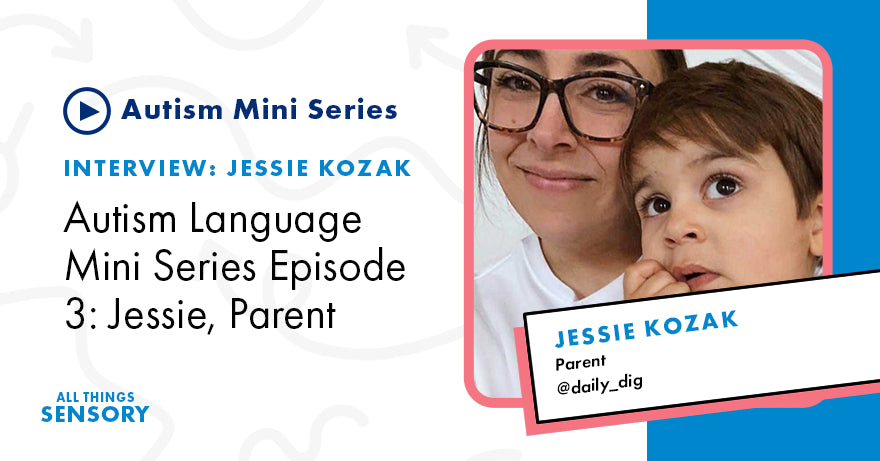Your Cart is Empty

April is Autism Acceptance Month. This month, we’re releasing one new episode each week, in addition to our regularly scheduled episodes. These episodes are all about the language surrounding Autism. We had the privilege of interviewing several people for this Mini Series and we’re excited for you to listen in!
Jessie is a social media manager, work-from-home mother, Autism advocate, and accidental influencer. She’s the mother to a wonderful 4-year-old boy and she shares their journey on Instagram.
Jessie’s Instagram @daily_dig
We’d love to answer your questions on the podcast! Fill out this form -> https://harkla.typeform.com/to/ItWxQNP3
Looking for more in-depth help? Sign up for 2-on-1 Mentoring With Us!!
All Things Sensory Podcast Instagram
Harkla Website - Shop Sensory Products!
When it comes to discussing autism, the language we use matters deeply—not only for autistic individuals but also for their families, professionals, and the broader community.
Over time, the words used to describe autism have shifted, sparking discussions about what terms are most inclusive and empowering.
In the past, phrases like "child with autism" were widely used, reflecting a "person-first" approach intended to emphasize the individual over their diagnosis. Recently, however, many autistic self-advocates and community members have preferred the term "autistic child," embracing "identity-first" language to acknowledge autism as an integral part of their identity.
For Jessie, a neurodivergent mom raising her four-year-old son, John, who is autistic, these language nuances highlight the importance of respecting individual preferences. She reflects, “John has autism, and he’s autistic. Both are true. What matters to me is that the language is never negative.”
Jessie noticed this shift in autism terminology about two years ago through social media. While John’s doctors and therapists initially referred to him as "a child with autism," she gradually saw a transition toward identity-first language, particularly in neurodiversity-affirming spaces like his therapy clinic.
Despite these changes, Jessie is flexible about how others refer to her son, focusing more on intent than terminology. “What’s most important to me is acceptance and inclusion. If someone uses language to show kindness and respect, that’s what really matters.”
The decision to use person-first or identity-first language often depends on personal or cultural context. For example:
Person-First Language: Phrases like "child with autism" focus on the individual, separating them from the diagnosis. Older generations of professionals and parents often prefer this approach.
Identity-First Language:Terms like "autistic child" emphasize autism as a core part of a person’s identity, a perspective championed by many self-advocates within the neurodiversity movement.
Jessie emphasizes that when her son is older, she’ll ask him which language he prefers. “Right now, it’s about fostering an environment where he feels proud of himself.”
For professionals working with children like John, staying current with the evolving language around autism is crucial. One therapist pointed out, “Language can either build a bridge of understanding or unintentionally create barriers.”
The shift toward identity-first language reflects a broader movement to honor autistic voices; However, adapting to these changes can be challenging for seasoned therapists. Jessie shares, “I’ve noticed older therapists sometimes struggle with these updates. It’s a learning curve, but the effort is worth it.”
When in doubt, follow the preferences of autistic individuals. Many advocacy groups and self-advocates share resources on why they prefer identity-first language.
Parents and caregivers should check in to see how they’d like their child referred. When the child is old enough, they should be involved in the conversation.
Regardless of terminology, prioritize creating a supportive, respectful, and affirming environment.
Language evolves over time, so approach these shifts with curiosity and a willingness to learn.
While language is important, Jessie reminds us that actions hold the greatest weight. “Acceptance is more than just words; It’s about showing, through inclusion and support, that autistic individuals are valued members of our community.”
For parents, therapists, and educators alike, the goal is to foster a world where autistic children like John can thrive—not despite their autism but because they are fully embraced for who they are.
BORING, BUT NECESSARY LEGAL DISCLAIMERS
While we make every effort to share correct information, we are still learning. We will double check all of our facts but realize that medicine is a constantly changing science and art. One doctor / therapist may have a different way of doing things from another. We are simply presenting our views and opinions on how to address common sensory challenges, health related difficulties and what we have found to be beneficial that will be as evidenced based as possible. By listening to this podcast, you agree not to use this podcast as medical advice to treat any medical condition in either yourself or your children. Consult your child’s pediatrician/ therapist for any medical issues that he or she may be having. This entire disclaimer also applies to any guests or contributors to the podcast. Under no circumstances shall Rachel Harrington, Harkla, Jessica Hill, or any guests or contributors to the podcast, as well as any employees, associates, or affiliates of Harkla, be responsible for damages arising from use of the podcast.
Keep in mind that we may receive commissions when you click our links and make purchases. However, this does not impact our reviews and comparisons. We try our best to keep things fair and balanced, in order to help you make the best choice for you.
This podcast should not be used in any legal capacity whatsoever, including but not limited to establishing “standard of care” in a legal sense or as a basis for expert witness testimony. No guarantee is given regarding the accuracy of any statements or opinions made on the podcast.
Comments will be approved before showing up.